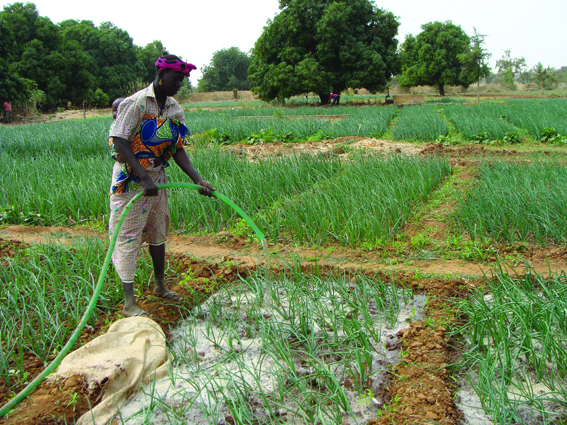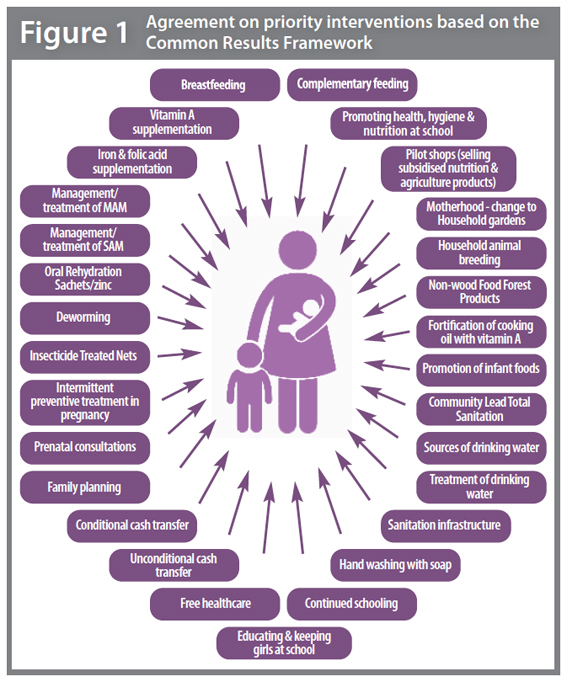REACHing for the SUN: UN support for scaling up nutrition in Burkina Faso
Dr Doudou Halidou Maimouna and Ousmane Ouedraogo are the REACH co-ordinators in Burkina Faso. Bertine Ouaro is Head of the Nutrition Department at the Ministry of Health.Chloé Denavit, Tania Goossens-Allen and Nicolas Bidault are all with the REACH Secretariat, based in Rome.
SUN Movement in Burkina Faso: Opportunities and challenges

Burkina Faso signed up to the SUN Movement in 2011 in order to tackle persistently high rates of undernutrition (30.2% stunting and 10.4% wasting prevalence among children under five)1 and to scale up activities that have a significant impact on nutrition. The Nutrition Director in the Ministry of Health is the Government’s SUN Focal Point and coordinates the National Council for Nutrition Coordination (Conseil National de Concertation en Nutrition) (CNCN), set up in 2008. Attached to the Ministry of Health, the CNCN brings together various ministries that contribute to nutrition (agriculture, education, water, hygiene and sanitation and social protection).
In Burkina Faso, nutrition interventions are covered by policies and programmes that are developed separately in different ministerial departments that do not share a common objective. Existing nutrition strategies and policy documents focus on the health/nutrition sector. This approach neglects factors that are essential when tackling malnutrition in, for example, the water and sanitation, agriculture, and social protection sectors. Linking nutrition to the health sector alone does not make it easy to coordinate a multi-sector approach, hence the need to create the CNCN, a body that overarches the key ministries.
The Government of Burkina Faso signed up to the REACH initiative in 2014 to take advantage of opportunities offered by improved coordination of the multi-sector approach to nutrition.
REACH contribution to the SUN Movement
REACH is founded on political commitments made through SUN and provides the Government with support to facilitate and coordinate nutrition governance at national level. The REACH facilitators work directly with the Government’s SUN Focal Point and the UN agencies’ nutrition technical committee to implement priority nutrition activities that have been identified and agreed by all the stakeholders.
More specifically, REACH support in Burkino Faso focuses on the following:
1. In-depth analysis of the nutritional situation and identification of needs using key REACH analysis tools:
• Existing nutrition surveys in relevant sectors were compiled in order to analyse the nutrition situation and to identify trends in different types of malnutrition and determining factors. Scoreboards covering the main indicators were developed to give an overview of the situation at national and regional level.
• Nutrition interventions and key nutrition actors were mapped in order to provide an overview of the geographical distribution of activities and actors (i.e.who does what and where). This mapping exercise, combined with the analysis of the nutritional situation, makes it possible to identify the best approaches and the most suitable strategies for scaling up priority interventions by comparing the extent to which target groups are covered.
• Finally, a review of the extent to which nutrition is included in policies and strategic plans in the sectors contributing to nutrition allows the case to be made for it to be better taken into account in sectoral planning.
2. Review of the National Nutrition Policy (NNP) and development of the Common Results Framework (CRF) for nutrition:
• Support from the REACH Secretariat in sharing experiences and good practices from other countries had a strategic impact on the drafting of these guidance documents.
• The REACH facilitators provided conceptual support to the SUN Focal Point for coordination, follow-up of commitments made by the various stakeholders, monitoring of activities, the creation of a multi-sector nutrition committee, efforts to find agreement amongst the stakeholders on the joint vision, and objectives.
• The NNP has a multi-sector focus and aims to reduce the various forms of malnutrition, primarily targeting stunting, as reflected in the CRF’s 29 key interventions in seven sectors (see diagram). An agreement on one set of results, to which all of the stakeholders contributed, led to the validation of the NNP.

3. The creation of SUN Movement networks:
• Burkina Faso has been slow to create UN networks for various reasons, including political instability, which has led to institutional changes and the appropriation of the SUN movement concept by the actors involved.
• REACH has played a key role in the gradual creation of SUN networks by mobilising resources to organise meetings between various actors and by helping to coordinate activities in the various sectors and the actors involved in the multi-sector nutrition platform.
• REACH facilitators have worked with the UN Network to support development of an annual action plan. This includes an advocacy plan, developed with the civil society networks (CSNs), with a common message of raising the profile of nutrition among Parliamentarians to facilitate meetings at that level and provide technical support.
Lessons learnt and next steps
Coordination work is complex and challenging. The SUN Movement Focal Point acts as the nutrition manager and requires technical assistance to fulfil this role. Cooperation between REACH, the SUN Focal Point, the UN networks and CSNs was therefore key to boosting the nutrition agenda. The REACH initiative came at a time when Burkina Faso was setting up its own multi-sector platform and starting the multi-sector planning process for nutrition. REACH provided critical technical and operational support to help the country make progress with its SUN commitments. Effort to develop synergies and achieve complementarity between the actions implemented through REACH and the UN agencies by mobilising stakeholders was a key step that helped to strengthen the outcomes. Whilst technical solutions are required if the SUN Movement is to be successful in a country, its success also depends on a favourable environment, commitment from all the actors involved and clear leadership by the SUN Focal Point. During the next phase, significant REACH support in Burkino Faso will be provided to:
• Successfully complete the strategic multi-sector nutrition plan in good time in order to provide decision makers with better guidance to improve nutrition. This plan will be accompanied by a monitoring and evaluation plan and an advocacy communication strategy.
• Ensure effective and efficient implementation of the plan by carrying out a national assessment of nutrition capacity-building needs.
• Analyse regional and municipal plans with a view to better integrating key interventions included in the strategic multi-sector nutrition plan.
• Develop a common nutrition agenda for UN agencies in order to guarantee complementarity with – and synergy between – national nutrition-related efforts.
Conclusion
The implementation of SUN and REACH in Burkina Faso required close coordination between the two initiatives. As a strong technical partner, REACH drew on the political commitments and the framework of the global SUN Movement to boost coordination of nutrition governance at the national level by: providing an assessment of the nutritional situation and identifying needs; reviewing the National Nutrition Policy; developing a Common Results Framework; and, above all, by creating SUN Movement networks. The importance of the development of networks becomes clear in light of the fact that REACH has a limited implementation period. Giving the SUN networks a formal status and creating a multi-actor coordination framework is a genuinely sustainable and durable strategy which can be drawn on after its implementation period has ended.
The REACH partnership (Renewed Efforts Against Child Hunger) was founded in 2008 by UNICEF, WHO, FAO, WFP, and later joined by IFAD. Since its inception, REACH has used and refined a multi-sectoral approach, focusing on countries that aim to build national capacity in nutrition governance and scaling up actions against malnutrition. REACH has been deployed in 20 countries to date, following requests from governments in Africa, Asia, Latin America and the Caribbean. The REACH team at country level typically has two facilitators supported by a global REACH secretariat based at WFP headquarters in Rome, which develops tools and guides, documents the best practices from countries and materials, and provides expertise to develop good governance in nutrition.
1 Results from the 2015 SMART nutrition study/Ministry of Health, Nutrition Department

